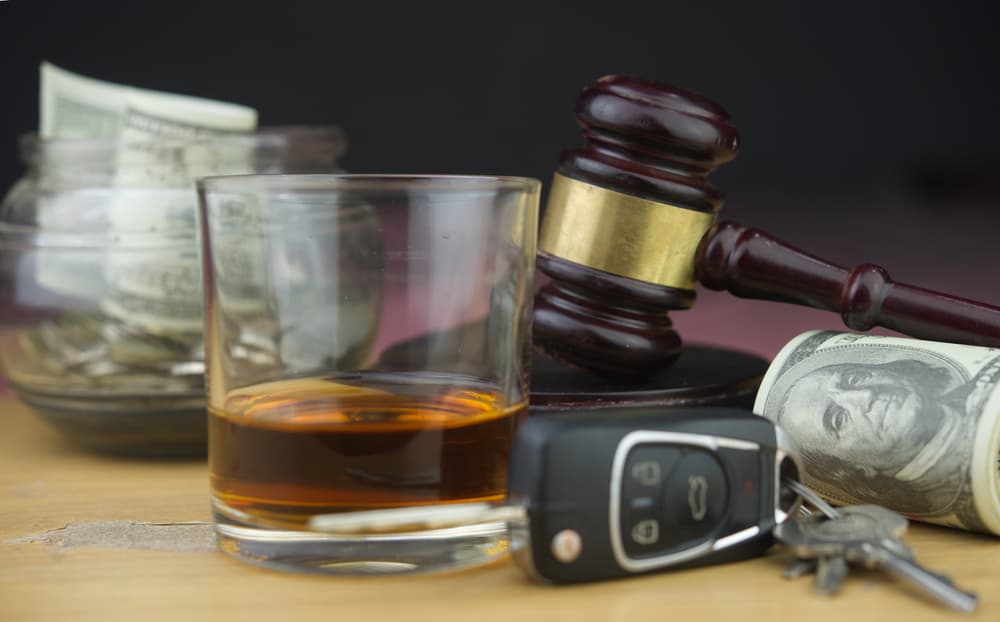Several countries have strict laws regarding driving under the influence (DUI), and they may not allow individuals with DUI convictions to enter their borders. Examples include Canada, which considers DUI offenses as serious criminal offenses, and Japan, where individuals with DUI convictions may be denied entry or deported.
Additionally, Australia, New Zealand, and the United Arab Emirates (UAE) have stringent policies regarding DUI convictions, potentially barring entry to individuals with such offenses on their record. These countries prioritize public safety and may impose strict consequences for DUI offenses, including restrictions on international travel.
In addition to the inability to travel to various countries following a DUI conviction, individuals may face other serious penalties, including monetary fines, jail time, and probation.
If you are currently facing a DUI charge, a knowledgeable DUI defense attorney can explore your legal options and may pursue a complete dismissal of your charge. If that is not possible, your lawyer can work to eliminate or lessen the penalties and collateral consequences you face.
How Does Someone Incur a DUI Charge?
In a DUI case, the prosecution must prove several legal elements to secure a conviction. These elements are crucial for establishing that the defendant was operating a vehicle while impaired by alcohol or drugs:
- Driving or Operating a Vehicle – The prosecution must first demonstrate that the accused individual (in other words, the defendant) was driving or operating a motor vehicle. This can be proven through witness testimony, police observations, or other evidence.
- Impairment or Intoxication – The prosecution must also establish that the defendant was under the influence of alcohol, drugs, or a combination of both at the time of driving. This fact can be supported by evidence such as field sobriety tests, blood alcohol concentration (BAC) tests, or the officer’s observations of the defendant’s behavior.
- Legal Blood Alcohol Concentration (BAC) Limit – In all jurisdictions, there is a legal limit for blood alcohol concentration (BAC), typically expressed as a percentage (0.08 percent). The prosecution must demonstrate that the defendant’s BAC met or exceeded this limit while driving. BAC levels can be measured through breathalyzer tests or blood tests.
- Probable Cause for Traffic Stop – The prosecution must also show that law enforcement had probable cause to stop the defendant’s vehicle. This means that the officer had a reasonable suspicion that the defendant was violating traffic laws or driving under the influence.
- Admissibility of Evidence – The prosecution must ensure that all evidence presented in court, including BAC test results, field sobriety tests, and witness testimony, is admissible under the rules of evidence. This includes establishing the reliability and accuracy of testing methods and procedures.
- Chain of Custody – If blood or urine samples were collected for testing, the prosecution must establish a proper chain of custody to ensure the integrity of the samples and the accuracy of the test results.
- Conduct of Law Enforcement Officers – The prosecution must show that law enforcement officers conducted the DUI investigation in accordance with established procedures and protocols. Any deviations or errors in the investigation may potentially undermine the prosecution’s case.
By proving these legal elements beyond a reasonable doubt, the prosecution can secure a conviction in a DUI case. However, defense attorneys may challenge the prosecution’s evidence and arguments to raise doubt about the defendant’s guilt.
Penalties for a DUI Conviction

A DUI conviction can result in a range of penalties, depending on factors like the defendant’s prior criminal record, the severity of the offense, and state laws. Some possible consequences associated with a DUI conviction include:
- Probation – A court may impose probation as part of a DUI sentence. During probation, the defendant must comply with specific conditions set by the court, such as attending alcohol education programs, refraining from alcohol consumption, and reporting to a probation officer regularly.
- Jail Time – In many cases, especially for repeat offenders or those involved in accidents causing injury or death, jail time is a possible consequence of a DUI conviction. The length of incarceration varies depending on state laws and the circumstances of the offense.
- Community Service – Courts may require individuals convicted of DUI to perform community service hours as part of their sentence. Community service typically involves completing unpaid work for a specified number of hours at nonprofit organizations or government agencies.
- Monetary Fines – DUI convictions often come with hefty fines, which can range from hundreds to thousands of dollars.
- Ignition Interlock Device Installation – In many states, individuals convicted of DUI may be required to install an ignition interlock device (IID) in their vehicle. This device requires the driver to pass a breathalyzer test before starting the car, preventing operation if alcohol is detected.
- Driver’s License Suspension or Revocation – One of the most significant consequences of a DUI conviction is the loss of driving privileges. Depending on state laws and the individual’s circumstances, the court may suspend or revoke the defendant’s driver’s license for a specified period. Some states offer restricted licenses that allow limited driving privileges, such as driving to work or school, during the suspension period. Additionally, completion of court-ordered requirements, such as alcohol education programs and treatment, may be necessary for license reinstatement.
Passport Restrictions Because of a DUI Conviction
A DUI conviction can have implications beyond just legal penalties. It can also affect international travel and passport privileges. While a DUI conviction itself does not automatically result in passport restrictions, certain circumstances may lead to limitations on traveling abroad.
One potential consequence of a DUI conviction is difficulty obtaining or renewing a passport. Some countries have strict entry requirements and may deny entry to individuals with criminal records, including DUI offenses. Additionally, certain countries have specific laws or policies regarding travelers with DUI convictions, which may affect visa eligibility or entry permissions.
Moreover, individuals with outstanding legal obligations related to their DUI conviction, such as unpaid fines or probation requirements, may encounter difficulties obtaining a passport or face restrictions on international travel. In some cases, courts may impose travel restrictions as part of a DUI sentence, prohibiting the defendant from leaving the country until certain conditions are met.
Furthermore, if a DUI offense involves serious injuries or fatalities, it may result in more severe legal consequences, including travel restrictions or limitations on obtaining a passport. For example, individuals convicted of vehicular manslaughter while driving under the influence may face additional restrictions on international travel as part of their sentence.
It’s essential to note that passport restrictions related to DUI convictions vary by country and depend upon the specific circumstances of the offense. While some countries may impose limitations on travelers with DUI convictions, others may not have such strict policies.
To avoid potential passport restrictions due to a DUI conviction, individuals should fulfill all legal obligations associated with their offense, such as paying fines, completing probation requirements, and attending court-ordered programs. Additionally, seeking legal counsel and understanding the potential consequences of a DUI conviction on international travel can help individuals navigate the process more effectively.
While a DUI conviction can complicate international travel, it’s possible to overcome these challenges with proper planning – and by adhering to legal requirements. By taking proactive steps to address the consequences of a DUI conviction, individuals can minimize disruptions to their travel plans and ensure compliance with all applicable laws and regulations.
Successfully Defending Against a DUI Charge
When facing a DUI charge in court, there are several defenses that individuals can raise to challenge the prosecution’s case. These defenses aim to cast doubt on the prosecution’s evidence and potentially lead to a charge reduction or a complete dismissal of the case. Here are some potential defenses to a DUI charge:
- Lack of Probable Cause – The Fourth Amendment to the U.S. Constitution protects individuals from unreasonable searches and seizures. If law enforcement officers did not have a valid reason (i.e. reasonable suspicion or probable cause) to stop the defendant’s vehicle, any evidence obtained during the stop may be deemed inadmissible in court.
- Improper Field Sobriety Tests – Field sobriety tests, such as the walk-and-turn or one-leg stand tests, are commonly used to assess a driver’s level of impairment. However, these tests are subjective and may be influenced by factors such as weather conditions, physical disabilities, or nervousness. Defense attorneys can challenge the administration or interpretation of field sobriety tests to undermine their reliability as evidence.
- Inaccurate Breathalyzer or Blood Tests – Breathalyzer and blood tests are used to measure a driver’s blood alcohol concentration (BAC). However, these tests are not infallible and can produce inaccurate results due to factors like improper calibration, equipment malfunction, or medical conditions. Defense attorneys may challenge the accuracy and reliability of BAC test results to undermine the prosecution’s case.
- Rising Blood Alcohol Defense – Alcohol absorption and elimination rates vary among individuals, and BAC levels may continue to rise even after a person has stopped drinking. The “rising blood alcohol” defense argues that the defendant’s BAC was below the legal limit at the time of driving but increased to an illegal level by the time of testing.
- Medical Conditions or Prescription Drugs – Certain medical conditions or prescription medications can mimic the effects of alcohol intoxication or impair a person’s ability to drive safely. Defense attorneys may argue that the defendant’s alleged impairment was due to a medical condition or the effects of prescription medication rather than alcohol consumption.
By raising these defenses and presenting evidence to support their claims, individuals charged with DUI can challenge the prosecution’s case and potentially achieve a favorable outcome in court. It’s crucial to consult with an experienced DUI defense attorney to determine the most effective defense strategy based on the specific circumstances of the case.
What is a Plea Deal in a DUI Case?

In a DUI case, a plea deal – which is also called a plea bargain – is an agreement between the defendant and the prosecution in which the defendant agrees to plead guilty or no contest to a lesser charge or to accept a reduced sentence in exchange for avoiding a trial. Plea deals are common in criminal cases, including DUI cases, and can offer both benefits and drawbacks for the defendant. Here’s an overview of the pros and cons of accepting a plea deal in a DUI case:
Pros:
- Reduced Charges – One of the primary benefits of accepting a plea deal is the opportunity to have the original DUI charge reduced to a lesser offense, such as reckless driving or a wet reckless charge. This can result in less severe penalties, including reduced fines, shorter license suspension periods, and avoidance of mandatory DUI education programs.
- Avoiding Trial – Trials can be lengthy, stressful, and costly affairs. By accepting a plea deal, defendants can avoid the uncertainty and potential consequences of a trial, including the possibility of harsher penalties if convicted.
- Faster Resolution – Plea deals can expedite the resolution of a DUI case, allowing defendants to move on with their lives more quickly. This can be particularly advantageous for individuals who wish to put the legal process behind them and focus on rehabilitation or other personal matters.
Cons:
- Admission of Guilt – By accepting a plea deal, defendants must admit to the underlying offense, even if they believe they are innocent or have viable defenses. This admission of guilt can have collateral consequences, such as implications for civil lawsuits or future employment opportunities.
- Limited Appeal Options – Once a plea deal is accepted and the defendant is sentenced, there are limited options for appeal. Defendants may be unable to challenge the conviction or sentence based on new evidence or legal errors that may have arisen during the trial.
- Loss of Rights – Depending on the terms of the plea deal, defendants may forfeit certain rights, such as the right to a jury trial or the right to confront witnesses. Plea deals may also include additional requirements, such as mandatory counseling or community service, which defendants must fulfill as part of the agreement.
Consulting with an experienced DUI defense attorney can help defendants understand their options and make informed decisions about whether to accept a plea deal in their case.
Call an Experienced Criminal Defense Lawyer about Your DUI Right Away
If you are currently facing a DUI charge, it’s important to retain an experienced criminal defense lawyer in your area to represent you. Your attorney will do everything possible to defend you against your charge and obtain a complete dismissal. However, if that is not available, your attorney can advocate for you during plea deal negotiations or a sentencing hearing and work to minimize the penalties and collateral consequences you face – including possible limitations on international travel.


